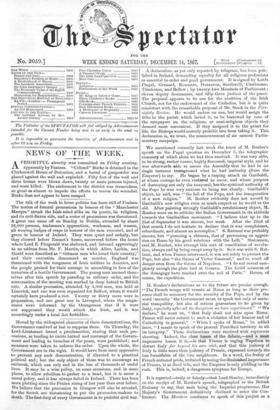M. Rouher's declarations as to the future are precise enough.
"The French troops will remain at Rome as long as their pre- sence shall be necessary for the security of the Pope, and by the word 'security' the Government mean to speak not only of mate- rial tranquillity, but also of serious guarantees to be given by Italy, especially after all the deceptions we have experienced." "We declare," he went on, "that Italy shall not seize upon Rome. France will never submit to such a violation of her honour and of Catholicity in general." "When I spoke of Rome," he added later, "I meant to speak of the present Pontifical territory in all its integrity." These declarations were received with rapturous cheering. Indeed, the clear lesson of the debate,—and a most impressive lesson it is,—is that France is urging Napoleon to thwart Italy far beyond his own wish, and that this jealousy of Italy is little more than jealousy of Prussia, expressed towards the less formidable of the two neighbours. In a word, the frerizy of French national pride, irritated by seeing the diminished importance of France, is at flood tide, and the Emperor is only yielding to the rush. This is, indeed, a dangerous symptom for Europe.






































